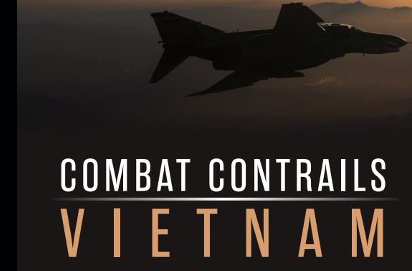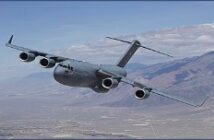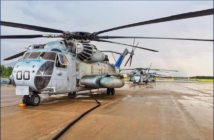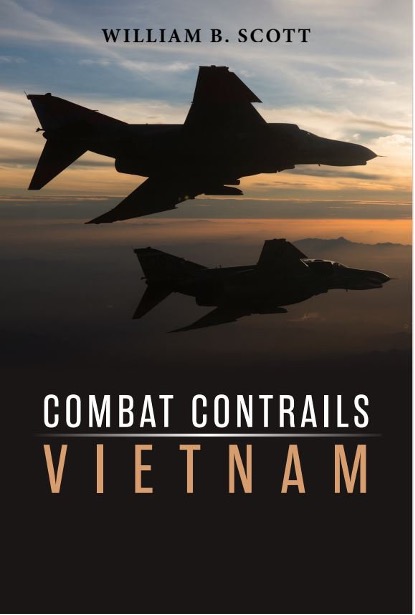 On May 11, 2023, the Grampaw Pettibone Squadron welcomed William B. (Bill) Scott, to talk about his book, Combat Contrails Vietnam, published 2021. Bill is an author and a consultant. He spent 22 years with the well-known international magazine, Aviation Week & Space Technology, retiring as the Rocky Mountain Bureau Chief. He wrote over 2,500 stories for the magazine about advanced aerospace, weapons technology, business, flight testing and military operations. He graduated from the U.S. Air Force Test Pilot School and spent 12 years as a test pilot on civilian and military aircraft, as well as flight testing for the magazine. He logged approximately 2,000 flight hours on 81 aircraft types.
On May 11, 2023, the Grampaw Pettibone Squadron welcomed William B. (Bill) Scott, to talk about his book, Combat Contrails Vietnam, published 2021. Bill is an author and a consultant. He spent 22 years with the well-known international magazine, Aviation Week & Space Technology, retiring as the Rocky Mountain Bureau Chief. He wrote over 2,500 stories for the magazine about advanced aerospace, weapons technology, business, flight testing and military operations. He graduated from the U.S. Air Force Test Pilot School and spent 12 years as a test pilot on civilian and military aircraft, as well as flight testing for the magazine. He logged approximately 2,000 flight hours on 81 aircraft types.
Scott’s book, Combat Contrails Vietnam, contains 18 stories collected through interviews and sharing of the experiences of Vietnam era veterans. Some events appeared in earlier print, while others were being told for the first time. The author had interviewed five veterans and either wrote the stories as told, or collaborated with them in contributing to the book content. The remaining thirteen stories were presented by the individual veterans.
Earlier publications contained accounts of both fiction and non-fiction events experienced by Vietnam era veterans. Some became well-known movies, while others made minimum impact. Unfortunately, far too many veterans who have already passed, took their memories with them.
Our speaker spoke with trepidation about the reception many Vietnam veterans received upon returning home. Insults, accusations and public anger caused many of them to keep silent, and deterred them from talking about their experiences. The author felt it was time to collect the stories, not only for the veterans’ families, but also for future generations. His book includes compelling and revealing stories. It is an opportunity to delve behind the curtain of headlines that often times misrepresented these veterans’ experiences. I, for one, encourage everyone to read the book.
The first story, “Are You Ready?” was written by an A-6 pilot and well-known author of “Flight of the Intruder”, Stephen Coonts. The story centers on the author’s thoughts preparing for a mission in Vietnam. Will it be his last mission? Will he see his family again? Preparing for the mission involved the removal of all personal items: wallet, letters, wedding ring and pictures. Is he going to be ready? The pilot final message in the story is, “yes, Lord, I am ready. I was born ready.”
The second story in Scott’s book, collected by our speaker and containing the thoughts of a veteran is entitled “Steel Storm”. This takes place on 28-29 of July, 1965 in South Vietnam near the north approach to a bridge near De Nang. Marine Corporal, Karl Lippard and a South Vietnamese Ranger, Sergeant Thi are scouting the area, searching for a large Viet Cong force known to be approaching the bridge. The two men are lightly armed and weather conditions are limiting their ability to hear approaching enemy. Radio contact is maintained by a land line with roughly twenty other Marines dug in on the south side of the bridge as well as other units on the radio network.
Corporal Lippard over-hears a South Vietnamese Army (ARVN) soldier speaking on the radio with a Vietcong agent about an imminent attack. He and Sergeant Thi prepare for combat as best as they can. As the attack starts, Corporal Lippard sends out a Mayday call for any station on the net. Air strikes are carried out by USMC Phantoms against the enemy with limited results. The two men respond with accurate gun fire. Subsequent Mayday calls result in a reply from a US Navy Destroyer, the USS John R. Craig. Accurate map coordinates radioed by the Corporal to the Destroyer begin to change the course of the attack. Assisted by a second destroyer, the USS Stoddard, naval gunfire destroys the enemy and while records are sketchy, 443 shells were fired in response to the Mayday calls. The almost five-hour battle devastates the enemy. No official records exist that detail the above encounter. Scott offers theories and thoughts to explain the silence of that event. Non were confirmed.
Another example of an untold story compiled by our speaker and acquired from a veteran, which may have made a difference in the outcome of the war in Vietnam is Scott’s story about an F-4 pilot called Farmer. The young man is on his first combat mission to a target in Hanoi. He is in number two position of a four-man flight, carrying a number of different weapons, including two 2,000LB laser guided bombs. All pilots in the flight were to release their bombs when the lead pilot calls “Pickle! Pickle! Pickle!” on the target. Farmer thinks he heard the command and releases his bombs too early. Shortly after, he hears the actual command and sees all planes release their bombs.
Upon returning to base, under heavy attack of enemy flak and missiles, Farmer expects to be grounded for his mistake, but no action is taken beyond a comment from his flight lead. A few days later, a news story catches his attention: A sensitive Communist facility in Hanoi was bombed. Farmer smiles and thinks to himself, perhaps his bombs were not wasted.
Bill Scott’s book includes fascinating stories about courage and heroism. The author’s presentation at the ANA meeting encouraged me to read the book. One of my favorite stories penned by Bill after interviewing the veteran is “Miracle Mission” about Major Richard Benson and rear cockpit crew reconnaissance officer, Captain Gerald Dobberfuhl. The crew is flying a version of the F-4 Phantom, and RF-4C. The mission is a daytime Visual Reconnaissance (VR) over North Vietnam. It happens on 16 September, 1969. Plane and crew are flying over a well-defended area that they photographed a few days earlier after it had been bombed. The flight is to check a road along a mountain pass between the North Vietnam-Laos border in a valley.
Approaching the target at a low altitude and fast speed to avoid enemy fire, ground fire hits the plane, damaging it and wounding the pilot. The back seat reconnaissance officer (RO) takes control of the plane, but the cockpit design prevents him from seeing over the nose to land the plane. The gear handle is only in the front seat. Ejecting both crew from the plane is not an option, since the ejection handle is also only in the front seat and the pilot most likely would not survive.
Calling the nearest field and declaring an emergency, the RO is assisted by verbal commands from the ground controller. AS the plane approaches the field, the injured pilot comes to, and takes control of the plane long enough to lower the gear and tail hook. After landing, the pilot is taken to the hospital. During the medical operation, the surgeon recovers a silver plate from the pilot’s chest. Even though he is not Catholic, a Saint Christopher medal, given to him by his wife, appears to have saved his life. The bullet was deflected by the medal enough to miss his heart. The pilot commented afterwards: “That mission is as vivid today as it was in 1969. Yes, some details have faded with time, but I know without a doubt that it was in the valley that I had one of my mountain top experiences.”
Major Tony Geishauser contributed to the book accounts with his story “Scrambled Eggs – Vietnam Style”. This takes place on 16 March 1966, when a UH-1 “Huey” helicopter he piloted was to deliver hot meals to an American unit located in a war zone. The helicopter arrived and began to descend straight down into a jungle covered area when enemy ground fire brought the helicopter down. A major battle occurred and eventually the Army unit and helicopter crew were rescued and the enemy eliminated. At a unit reunion almost four decades later, the Major delivered more than 300 McDonald’s Egg McMuffin gift certificates announcing, “The Cowboy’s always deliver, even if it takes a second try, thirty-some years later.”
The accounts presented in the talk by the author is intended to be a brief exploration of the stories shared with members of the Squadron. Each of the stories captured in the book contain the details of individual missions and the thoughts of the author or co-author. To fully appreciate the content of each story, I encourage you to consider obtaining a copy of the book.
If you, the reader were in the military in Vietnam or other parts of the world, thank you for your service. For some of you, sharing your memories may be difficult, while for others the time that has passed may have clouded what you do recall. If you can, record your thoughts, share them with those who were there; compare your experiences. If you are able, step out of the shadow of time that has passed and help those who serve today, to let them know that they are not alone.
The Grampaw Pettibone Squadron wishes to thank William Scott for his service, and his skill in bringing these stories to those in attendance at our meeting.
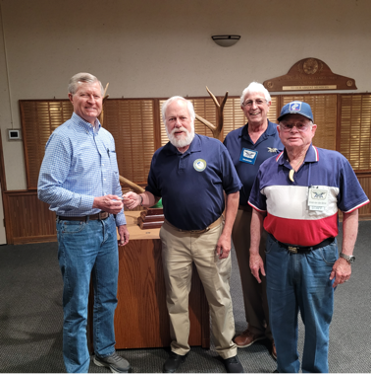
ANA Meeting – May 2023 – Left to right: Bill Scott (speaker), David Malmad (PAO), Tim Brown (Commander), Vince Vander Brink (Staff)

